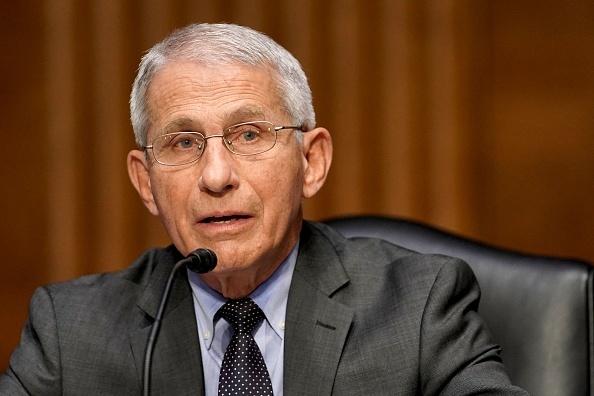Conservatives are spending big on bashing Anthony Fauci


A free daily email with the biggest news stories of the day – and the best features from TheWeek.com
You are now subscribed
Your newsletter sign-up was successful
Conservatives are fundraising, list-building, and spending big on bashing Dr. Anthony Fauci, an effort that has redoubled following the release of his emails through various Freedom of Information Act requests this week. But while the emails have given Fauci's critics new fodder — albeit, with a distinctly conspiratorial bent — they're also the culmination of a months-long effort to discredit the nation's top infectious disease expert. In the past month, for example, Republicans and conservative interests have dumped some $300,000 into Facebook ads targeting Fauci, Politico reports based on data from Bully Pulpit Interactive.
More recently, conservatives have selectively pointed to Fauci's emails to make the false claim that the correspondences offer proof the director of the National Institute of Allergy and Infectious Diseases "privately supported a theory that the virus leaked from a Chinese lab and lied about masks in an effort to amass political power," Politico writes, going on to clarify that "neither was true. Fauci has said he thinks it's more likely that the virus spread from animal to human but would not rule out a lab leak, and while he initially downplayed the need for masks, it was, he said, out of fear that medical professionals would lose access to them if the public began panic purchasing."
Still, conservatives sense their opening. Former President Donald Trump's senior advisor, Jason Miller, explained to Axios that the reaction to Fauci among the politician's base is "visceral": "People see Anthony Fauci and they think of shuttered businesses, lost school." Trump reportedly plans to capitalize on that emotion, and make Fauci his "new Hillary" at upcoming rallies, Axios adds.
The Week
Escape your echo chamber. Get the facts behind the news, plus analysis from multiple perspectives.

Sign up for The Week's Free Newsletters
From our morning news briefing to a weekly Good News Newsletter, get the best of The Week delivered directly to your inbox.
From our morning news briefing to a weekly Good News Newsletter, get the best of The Week delivered directly to your inbox.
The National Republican Senatorial Committee, meanwhile, is also fundraising and list-building through longtime Fauci critic Sen. Rand Paul (R-Ky.), who is calling on President Biden to fire the NIAID director.
"Targeting Fauci erodes trust in scientific institutions and makes them seem partisan – just as universities are increasingly seen as partisan, the media, the bureaucracy," Karen Kornbluh, a senior fellow and director of GMF Digital at the German Marshall Fund of the U.S., told Politico, adding: "These strategies don't have an easy response."
A free daily email with the biggest news stories of the day – and the best features from TheWeek.com
Jeva Lange was the executive editor at TheWeek.com. She formerly served as The Week's deputy editor and culture critic. She is also a contributor to Screen Slate, and her writing has appeared in The New York Daily News, The Awl, Vice, and Gothamist, among other publications. Jeva lives in New York City. Follow her on Twitter.
-
 The best music tours to book in 2026
The best music tours to book in 2026The Week Recommends Must-see live shows to catch this year from Lily Allen to Florence + The Machine
-
 Gisèle Pelicot’s ‘extraordinarily courageous’ memoir is a ‘compelling’ read
Gisèle Pelicot’s ‘extraordinarily courageous’ memoir is a ‘compelling’ readIn the Spotlight A Hymn to Life is a ‘riveting’ account of Pelicot’s ordeal and a ‘rousing feminist manifesto’
-
 The EU’s war on fast fashion
The EU’s war on fast fashionIn the Spotlight Bloc launches investigation into Shein over sale of weapons and ‘childlike’ sex dolls, alongside efforts to tax e-commerce giants and combat textile waste
-
 A Nipah virus outbreak in India has brought back Covid-era surveillance
A Nipah virus outbreak in India has brought back Covid-era surveillanceUnder the radar The disease can spread through animals and humans
-
 Trump HHS slashes advised child vaccinations
Trump HHS slashes advised child vaccinationsSpeed Read In a widely condemned move, the CDC will now recommend that children get vaccinated against 11 communicable diseases, not 17
-
 Covid-19 mRNA vaccines could help fight cancer
Covid-19 mRNA vaccines could help fight cancerUnder the radar They boost the immune system
-
 FDA OKs generic abortion pill, riling the right
FDA OKs generic abortion pill, riling the rightSpeed Read The drug in question is a generic version of mifepristone, used to carry out two-thirds of US abortions
-
 The new Stratus Covid strain – and why it’s on the rise
The new Stratus Covid strain – and why it’s on the riseThe Explainer ‘No evidence’ new variant is more dangerous or that vaccines won’t work against it, say UK health experts
-
 RFK Jr. vaccine panel advises restricting MMRV shot
RFK Jr. vaccine panel advises restricting MMRV shotSpeed Read The committee voted to restrict access to a childhood vaccine against chickenpox
-
 Texas declares end to measles outbreak
Texas declares end to measles outbreakSpeed Read The vaccine-preventable disease is still spreading in neighboring states, Mexico and Canada
-
 RFK Jr. shuts down mRNA vaccine funding at agency
RFK Jr. shuts down mRNA vaccine funding at agencySpeed Read The decision canceled or modified 22 projects, primarily for work on vaccines and therapeutics for respiratory viruses
